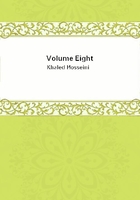
第119章
[187]Arab.'Ghashiyah'=lit.an etui,a cover; and often a saddle-cover carried by the groom.
[188]Arab.'Sharab al-tuffah' = melapio or cider.
[189]Arab.'Mudawwarah,' which generally means a small round cushion,of the Marocco-work well known in England.But one does not strike a cushion for a signal,so we must revert to the original-sense of the word 'something round,' as a circular plate of wood or metal,a gong,a 'bell' like that of the Eastern Christians.
[190]Arab.'Tufan' (from the root tauf,going round) a storm,a circular gale,a cyclone the term universally applied in Al-lslam to the 'Deluge,' the 'Flood' of Noah.The word is purely Arabic;
with a quaint likeness to the Gr.{Greek letters},in Pliny typhon,whirlwind,a giant (Typhoeus) whence 'Typhon' applied to the great Egyptian god 'Set.' The Arab word extended to China and was given to the hurricanes which the people call 'Tee foong,' great winds,a second whimsical-resemblance.But Sir John Davis (ii.383) is hardly correct when he says,'the name typhoon,in itself a corruption of the Chinese term,bears a singular (though we must suppose an accidental) resemblance to the Greek {Greek letters}.'
[191]Plurale majestatis acting superlative; not as Lane supposes (ii.224) 'a number of full moons,not only one.' Eastern tongues abound in instances beginning with Genesis (i.1),'Gods (he) created the heaven,' etc.It is still preserved in Badawi language and a wildling greatly to the astonishment of the citizens will address his friend 'Ya Rijal'= O men!
[192]Arab.'Hasid' = an envier: in the fourth couplet 'Azul'(Azzal,etc.) = a chider,blamer; elsewhere 'Lawwam' = accuser,censor,slanderer; 'Washi,'=whisperer,informer; 'Rakib'=spying,envious rival; 'Ghabit'=one emulous without envy; and 'Shamit'= a 'blue' (fierce) enemy who rejoices over another's calamities.
Arabic literature abounds in allusions to this unpleasant category of 'damned ill-natured friends;' and Spanish and Portuguese letters,including Brazilian,have thoroughly caught the trick.In the Eastern mind the 'blamer' would be aided by the 'evil eye.'
[193]Another plural for a singular,'O my beloved!'
[194]Arab.'Khayr'=good news,a euphemistic reply even if the tidings be of the worst.
[195]Abbas (from 'Abs,being austere; and meaning the 'grim faced') son of Abd al-Muttalib; uncle to Mohammed and eponym of the Abbaside Khalifahs.A.D.749=1258.
[196]Katil = the Irish 'kilt.'
[197]This hat been explained as a wazirial title of the time.
[198]The phrase is intelligible in all tongues: in Arabic it is opposed to 'dark as night,' 'black as mud' and a host of unsavoury antitheses.
[199]Arab.'Awwadah,' the popular word; not Udiyyah as in Night cclvi.'Ud' liter.= rood and 'Al-Ud'=the wood is,I have noted,the origin of our 'lute.' The Span.'laud' is larger and deeper than the guitar,and its seven strings are played upon with a plectrum of buffalo-horn.
[200]Arab.'Tabban lahu!'=loss (or ruin) to him.So 'bu'dan lahu'=away with him,abeat in malam rem; and 'Suhkan lahu'=Allah and mercy be far from him,no hope for him I
[201]Arab.'Ayah'=Koranic verses,sign,miracle.
[202]The mole on cheek calls to prayers for his preservation;
and it is black as Bilal the Abyssinian.Fajran may here mean either 'A.-morning' or 'departing from grace.'
[203]i.e.the young beard (myrtle) can never hope to excel tile beauties of his cheeks (roses).
[204]i.e.Hell and Heaven.
[205]The first couplet is not in the Mac.Edit.(ii.171)
which gives only a single couplet but it is found in the Bres.
Edit.which entitles this tale 'Story of the lying (or false kazib)
Khalifah.' Lane (ii.392) of course does not translate it.
[206]In the East cloth of frieze that mates with cloth of gold must expect this treatment.Fath Ali Shah's daughters always made their husbands enter the nuptial-bed by the foot end.
[207]This is always done and for two reasons; the first humanity,that the blow may fall unawares; and,secondly,to prevent the sufferer wincing,which would throw out the headsman.
[208]Arab.'Ma'ani-ha,' lit.her meanings,i.e.her inner woman opposed to the formal-seen by every one.
[209]Described in my Pilgrimage (iii.168,174 and 175): it is the stone upon which the Patriarch stood when he built the Ka'abah and is said to show the impress of the feet but unfortunately I could not afford five dollars entrance-fee.Caliph Omar placed the station where it now is; before his time it adjoined the Ka'abah.
The meaning of the text is,Be thy court a place of pious visitation,etc.At the 'Station of Abraham' prayer is especially blessed and expects to be granted.'This is the place where Abraham stood; and whoever entereth therein shall be safe' (Koran ii.119).
For the other fifteen places where petitions are favourably heard by Heaven see ibid.iii.211-12.
[210]As in the West,so in the East,women answer an unpleasant question by a counter question.
[211]This 'Cry of Haro' often occurs throughout The Nights.In real-life it is sure to colece a crowd.especially if an Infidel (non Moslem) be its cause.
[212]In the East a cunning fellow always makes himself the claimant or complainant.
[213]On the Euphrates some 40 miles west of Baghdad The word is written 'Anbar' and pronounced 'Ambar' as usual with the 'n'before 'b'; the case of the Greek double Gamma.
[214]Syene on the Nile.
[215]The tale is in the richest Rabelaisian humour; and the requisitions of the 'Saj'a' (rhymed prose) in places explain the grotesque combinations.It is difficult to divine why Lane omits it: probably he held a hearty laugh not respectable.